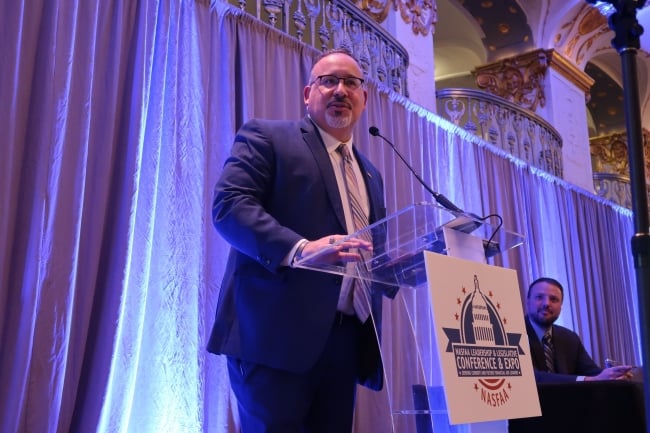You have /5 articles left.
Sign up for a free account or log in.

Education Secretary Miguel Cardona made a last-minute appearance at a financial aid conference Monday to announce the plan, which earned tepid reactions from college officials.
National Association of Student Financial Aid Administrators
More than a month after the Education Department’s rocky launch of its new Free Application for Federal Student Aid, the agency on Monday detailed new plans to support colleges struggling to accommodate a series of delays and hitches. But the plan didn’t go as far as many college and university administrators were hoping.
The department will allocate $50 million and stand up a “concierge service,” set to open this week, as part of a broader FAFSA College Support Strategy aimed at helping colleges process financial aid packages quickly and accurately. Financial aid experts and advisers will also be dispatched to “under-resourced campuses,” with a special focus on minority-serving institutions. A senior department official said all historically Black and tribal colleges will have the opportunity to get direct support from the agency.
Such colleges have been affected more acutely by the FAFSA delays than those that have fewer Pell-eligible students or larger financial aid offices and robust technical resources.
The department also plans to send test versions of Institutional Student Information Records, or ISIRs, this month so that colleges can prepare their systems for the new forms—something financial aid offices have been asking for since the fall. The department sent out just three test ISIRs in September.
The news comes after significant backlash to the department’s announcement last week that colleges would not begin receiving student FAFSA information until mid-March, pushing back institutional timelines, prompting a frantic avalanche of deadline extensions from financial aid offices and sparking strong criticism from federal lawmakers.
Education Secretary Miguel Cardona stressed that the changes will “be worth” the challenges and delays that have plagued the rollout from the start.
“Make no mistake, the better FAFSA is going to be transformational,” he said on a call with reporters Monday afternoon. “I understand delays have been frustrating for institutions. They’ve been frustrating for me, too. But let’s keep in mind that we’re completely overhauling a broken system.”
Too Little, Too Late?
The department’s offering, however, is less substantive than many higher ed leaders and financial aid officials had hoped for.
At the National Association of Student Financial Aid Administrators’ annual Leadership & Legislative Conference in Washington, D.C., Monday evening, Cardona made a keynote appearance—a last-minute addition to the schedule—to announce the news publicly and assure institutions that the department was committed to helping them navigate the new forms.
“I know it’s given us headaches. I know it’s not where we might want to be right now. But these things are worth fighting for,” he said. “You’re stepping up for students in a challenging year … But we are in this together. We see you, and we hear you.”
Cardona received a muted response from a packed conference room of financial aid professionals—many of whom, in conversations at the reception afterward, said they were disappointed or confused by the news.
Some expected Cardona to announce that the department would waive income verification requirements, like it did in 2020 at the start of the pandemic; others hoped for an extension of the deadline for complying with new gainful-employment rules or a hard commitment to a March deadline for submitting ISIR forms to colleges. A concierge service and on-call financial aid consultants, attendees largely agreed, were not the most helpful steps the department could have taken.
“Unfortunately, my first reaction is that this is an underwhelming response to our current crisis,” said Kiely Fletcher, vice president for enrollment management at the University of Illinois at Chicago, the first institution to extend its commitment deadline to June 1 after last week’s delay. “While we appreciate the secretary providing an updated timetable on the release of test ISIRs, the partial measures do little to alleviate the burden and anxiety expressed by students, their parents and higher ed professionals.”
Cardona earned some relieved sighs and applause when he announced that additional test ISIR forms would be sent out. Many attendees said that was a necessary resource to help even well-resourced institutions prepare their systems for the influx of new forms and revised aid eligibility calculations—though it was something they’d sought months ago.
Some attendees were encouraged by the allocation of resources, and even by Cardona’s mere presence at the conference, which they said was a sign that the department recognizes the frustration many in the field have felt throughout the fraught rollout.
“It’s a loud clarion call saying, ‘We’re in this together,’” said DeAnna Nwankwo, chief compliance officer at Prairie View A&M University.
But even the most optimistic attendees were puzzled by the department’s refusal to assume any responsibility for the challenges the rollout has presented.
NASFAA president Justin Draeger said there would be “time for that later” and that “it’s never too little or too late” for much-needed assistance to help colleges serve students. As a nonprofit partner, NASFAA will play a significant role in the department’s plan, though the details on how exactly it will help facilitate those resources are still being ironed out, Draeger said.
“The department is focusing on [determining] which schools need the most help right now,” he said. “Our part of the equation is, how do we bring the resources to bear and recruit the experts to come in?”
In the meantime, NASFAA has several outstanding requests for the department—first and foremost, loosening income verification requirements for institutions, he said. College financial aid officers have also asked the department to communicate realistic time frames and next steps to students, increase the availability of customer support, and pause “non-urgent oversight activities.”
Hoping for More
Colleges and universities have been preparing for the new FAFSA for years, but this is the first time the department has extended additional resources to directly aid that effort. Officials did not say why they didn’t roll out this plan sooner.
“We are in constant dialogue with our partners, schools and the vendors that serve them about how to help them get through,” a senior department official said on the call with reporters. “The steps that we’re taking today arose out of those conversations that we’ve had with the community.”
Department officials didn’t give any concrete updates on when it will resolve the technical issues with the new form, including one glitch that prevents students whose parents do not have a Social Security number from completing it.
The $50 million comes from federal funds collected by the Educational Credit Management Corporation, a nonprofit that specializes in higher education finance. ECMC will distribute the money to nonprofits focused on financial aid support and services, including NASFAA. The department wants the money to go toward mobilizing a force of financial aid experts—retired university officials, academics and other would-be reservists—to provide additional support to underresourced institutions.
North Carolina representative Virginia Foxx, the Republican chairwoman of the House education committee, said in a statement that Monday’s announcement “doesn’t change the facts.”
“Millions of students and families are being negatively impacted by [the] administration’s outrageous incompetence to implement a bipartisan law Congress passed more than three years ago,” she said. “The department’s response is a poor attempt to rebrand its way out of a total mess caused solely by this administration. It is insulting.”









